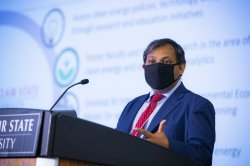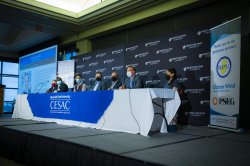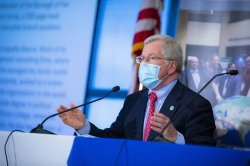A Path to a Greener Future
Clean Energy and Sustainability Analytics Center holds annual Energy Summit
Posted in: Science and Technology, University

Policy makers, energy stakeholders and faculty gathered at the third annual Clean and Sustainable Energy Summit on September 23, hosted by Montclair State’s Clean Energy and Sustainability Analytics Center (CESAC).
Sponsored by the New Jersey Board of Public Utilities, Public Service Enterprise Group (PSEG) and Ocean Wind, the summit served as a forum to exchange ideas and discuss New Jersey’s plans for a sustainable future.
“Tackling the biggest impacts of climate change is critical to the world today,” says Pankaj Lal, director of CESAC and professor of Earth and Environmental Studies. “Effective communication between academics/researchers and decision-makers is a challenge, this summit gives all of us the opportunity to assist the fight against climate change with our ability to provide data-driven and actionable management strategies.”
A common thread from presenters and speakers throughout the day was the message that it’s not enough to just create policy. Building a path for a cleaner future means not only acting on the policies, but talking about them so that as many people as possible understand the sense of urgency surrounding climate issues.
“If that UN report is correct, we don’t have a lot of time,” Joseph Fiordaliso, president of the New Jersey Board of Public Utilities, said during his keynote speech at the summit. “The Code Red alert is not for the next century, it’s for the next decade. I implore you, when you have the opportunity, talk about climate change. Indicate to friends and family the dire effects and that we have a moral obligation to future generations to mitigate the effects of climate change.”
In his opening remarks to guests, Montclair President Jonathan Koppell shared that it is the duty of a university to use its platform and resources to serve and inform the public.
“We have a lot of challenges that we’re facing as a planet today, but there is nothing more important than the issue of sustainability, how we generate energy and how we protect the climate,” he said. “That’s the stakes here; what will be the future of humanity? The idea in my mind of what it means to be a public university is its purpose and mission to address public needs. One way is to educate our students to be agents of change.”

Sessions at this year’s summit, which notably took place during National Clean Energy Week, focused on key themes including new solar power policies, offshore wind power, the Regional Greenhouse Gas Initiative (RGGI), transportation emissions and electric vehicle infrastructure, and energy equity and environmental justice.
One focus area — electric vehicles and the dire need to reduce transportation emissions– is one that would directly affect the millions of drivers and commuters here in the Garden State. Cathleen Lewis, e-mobility program manager at New Jersey Board of Public Utilities , explained that one way to convince the general public to change transportation habits is to highlight the personal benefits.
“The way we’re going to do that is by proving to them that this is appropriate, easy, efficient, affordable. We need to show people that it makes a difference…and if money is the last thing keeping you [from getting an electric vehicle], we are going to do what we can to help you.”

Addressing serious climate issues can’t only be about asking people to change their habits, presenters explained. It’s about addressing the needs of those who are directly affected and impacted by climate issues.
Crystal Pruitt, deputy director for clean energy equity at the New Jersey Board of Public Utilities, spoke about the meaning of community and equity when it comes to creating and meeting clean energy goals.
“We cannot achieve the goal of 100% clean energy by 2050 without thinking of all the communities in our state,” Pruitt said.
Clean energy goals can be prohibitive for some communities, she explained, and “the goal of this office is to ensure suitable access to all residents, especially low-income communities that have been disenfranchised and left behind. Energy equity can be ambiguous topics, but we want hard data and stories so we can build trusting and reciprocal relationships with people in these communities.”

CESAC and Montclair State University are leaders in helping the state meet its energy goals and create policy that is equitable and address major climate challenges.
Lora Billings, dean of the College of Science and Mathematics at Montclair, noted that the mission of the summit aligns well with the University’s sustainability goals in that it embraces the collaborative partnerships and networking necessary to bring out effective change – one such project that will soon be underway is a team effort between University Facilities and CESAC to develop a grid center on campus.
“We combined energy, sustainability, data analytics with cyber security and grid management. Montclair State University is a leader in energy analytics, and our expertise in microgrid infrastructure can be harnessed and shared to help others with energy management and resilience. Our location and status as a majority minority institution is perfect to develop this type of infrastructure and clean energy diversity, and this is just one of the many ways we’ll be continuing to solve climate change and sustainability problems through CESAC.”
For more information on the Clean Energy and Sustainability Analytics Center, visit montclair.edu/cesac.
